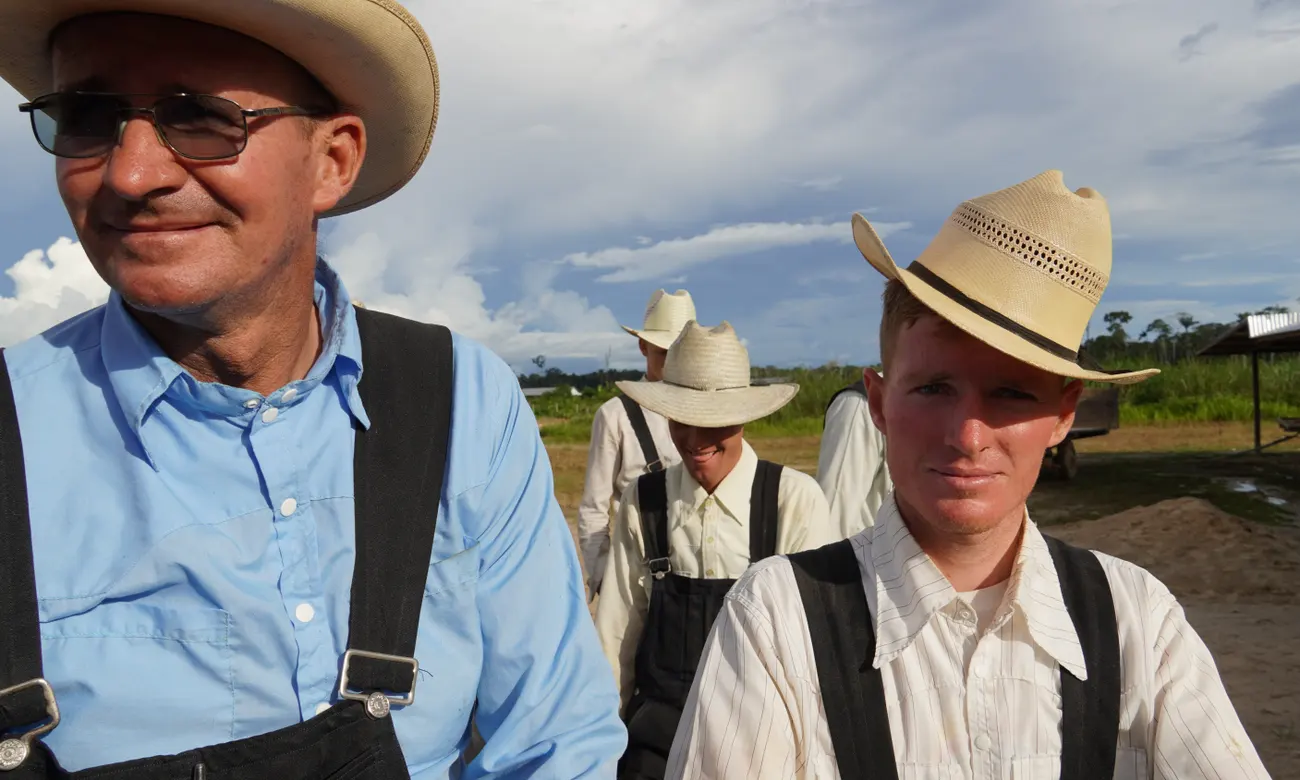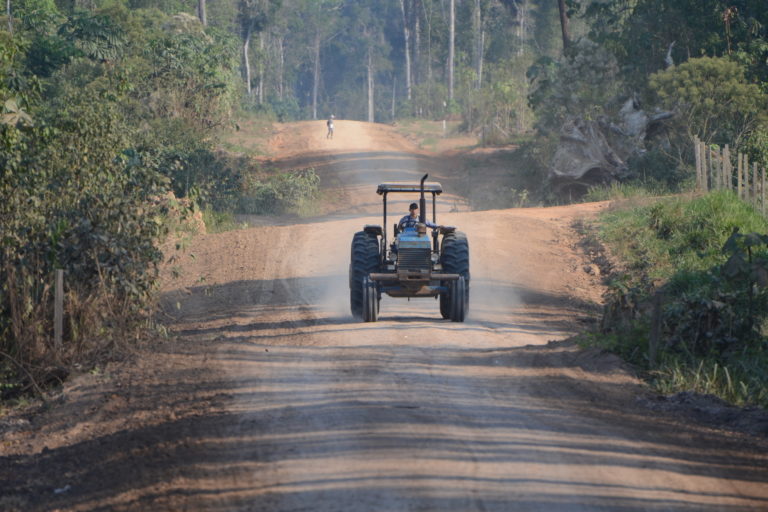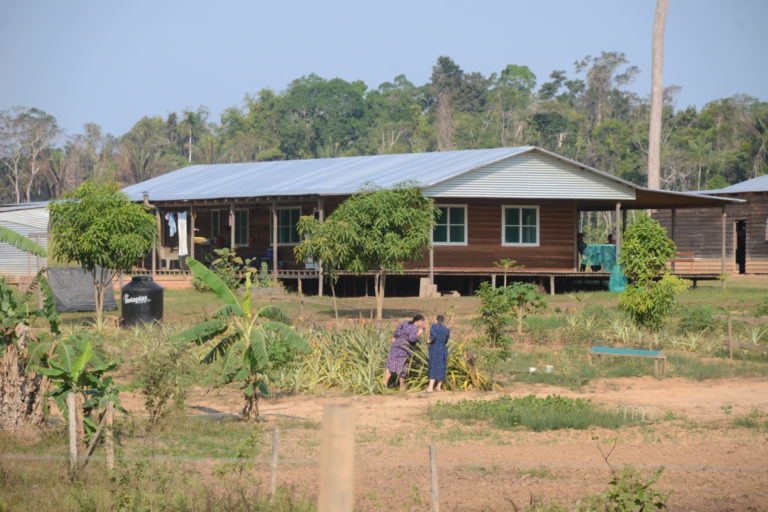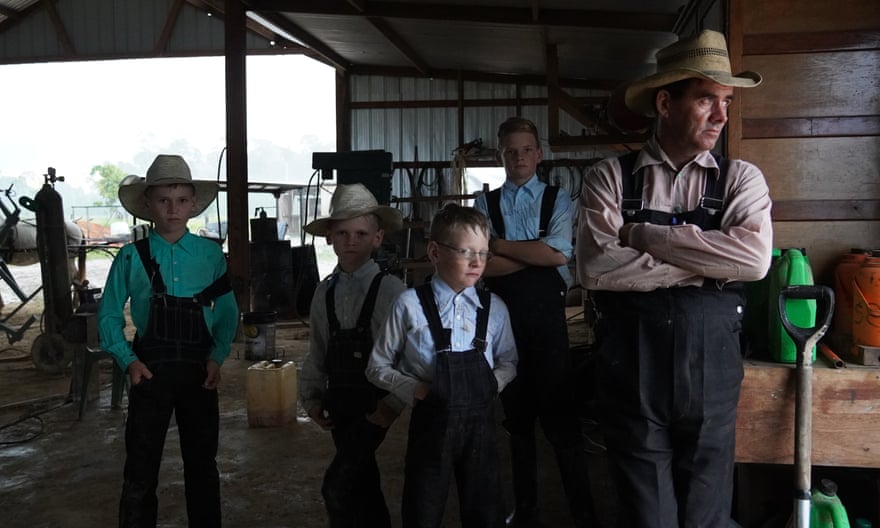Were it not for the lush Amazon rainforest that surrounds it, Wanderland could almost look like a piece of 19th-century Dutch farmland; a straight, muddy path cuts through rows of neatly arranged farms with perpendicular houses and barns.
A typical morning begins with blond-haired, blue-eyed, smiling boys in horse-drawn carriages picking up gleaming jugs of fresh milk from the farm gates to be made into cheese.
The name of this rural idyll carved out of the dense green of the jungle hardly seems to need translation, even from the Plautdietsch, a mixture of Low German and Dutch, spoken by its inhabitants.

But there is unrest in this rural paradise.
It’s one of three Mennonite communities under investigation by Peru’s attorney general’s office, accused of illegally cutting down more than 3,440 hectares (34 square kilometers) of tropical rainforest in the past five years.
The brush with the law has alarmed the community of about 100 families who fear they could lose the land they have made their home.
Abraham Thiesen, 44, came to Peru in 2015 with his wife and six children, is one of several hundred members of the secretive Christian Anabaptist group, whose origins date back to 16th-century Friesland and who immigrated with others from Belize, where they have long resided.
Thiesen, president of the Wanderland Mennonite Association, says they acquired the land in good faith for agricultural purposes, assuming they would obtain legal title once the area was cleared for farming.
But that explanation was rejected by environmental prosecutor José Luis Guzmán. “I can’t clear first and then ask for a permit! It doesn’t work that way,” he stressed.
“To do deforestation there – to remove the vegetation cover of trees and forests – you need a state permit, and in this case, they didn’t have one,” Guzmán said.
He has investigated whether the Christian group should be formally accused of deforestation.

“We came here for good,” Thiesen replied.
Entire families, usually with four to seven children, had been uprooted from their communities in Bolivia’s vast lowlands and invested their life savings in the new land deep in the Peruvian Amazon.
“We’re not thinking of moving because we’re already settled here,” Thiesen adds. “We hope we will be allowed to work peacefully because where will we get enough to eat if they don’t let us work the land?” he affirmed.
They believe God has commanded them to till the land to live since Adam and Eve were driven out of the Garden of Eden.
But these Old Order Mennonites, the most orthodox of the pacifist sect that had spread from Canada to India in search of seclusion and large tracts of land, may have fallen into the notorious informality and corruption often associated with land grants in the Peruvian Amazon.
They say they initially bought 500 hectares (5 square miles) of land near Pucallpa in 2015, which they traded with a wealthy timber trader for more than 3,000 hectares of rainforest where the three communities are located.
The remote jungle area suited the Mennonites’ preference to be left alone.
To reach this region requires a 14-hour journey by boat down the Ucayali River – and another hour over a muddy dirt road to visit the community, which is about halfway between Pucallpa and Iquitos, the largest city in the world, accessible only by boat or plane.

The closest accommodation to the new Mennonite colonies, Tierra Blanca, is a poor riverside outpost that occasionally experiences outbreaks of violence because it lies on a cocaine trafficking route.
Locals greet the dungaree-clad settlers and women in long cape dresses with curious amusement.
Old-timers say decades of logging have stripped the forest where the communities now live of all its valuable tropical hardwoods.
“It was a secondary forest because the loggers had already used up all the wood,” Thiesen said.
“We don’t work with wood. We prefer the soil to work the land,” he added, although he admitted that the leftover timber was used to build “houses, schools, churches, bridges, some small things.”
Legally, this is an important distinction. Secondary forest is one step closer to purma, the scrub that grows after the trees are cut down.
Purma can be legally converted to agricultural use while cutting primary rainforest is illegal.
Matt Finer, a senior research specialist with the non-governmental organization Amazon Conservation, disagrees with Thiesen’s claim. “The area has been selectively logged, like much of the Amazon, but it is still primary forest.”
Mennonite settlements have become the “new main cause of large-scale deforestation in Peru,” he said.
“In total, we have documented the deforestation of 3,968 hectares in four new colonies established in the Peruvian Amazon since 2017,” he added.
Three of those four colonies are located in Tierra Blanca.
Environmentalists fear this may be just the beginning of the Mennonite invasion of Peru.
Satellite images show land being cleared for another settlement in Loreto, a vast Amazon region the size of Germany.

According to a 2021 study published in the Journal of Land Use Science, the Mennonites have 200 settlements in seven Latin American countries and claim more land than the Netherlands.
According to Peru’s Ministry of Environment, Peru lost a record 2,032 square kilometers in the Amazon to deforestation in 2020, nearly four times the 548 square kilometers it lost in 2019.
The Mennonites may be an easy target for environmental advocates, but their neighbors have rushed to their aid.
“The Mennonite colony has changed the face of this village,” says Medelú Saldaña, the former mayor of Tierra Blanca.
“We are blessed to be able to learn from this orderly agriculture.”
The Mennonites sell their cheese and other dairy products locally, and as experts in growing soy, sorghum, and rice, their agricultural know-how is valued by locals.
“They have come to stimulate the economy in our district, where the state neither appears nor invests,” Saldaña added.
Because of their faith, the Christian group is prohibited from using modern technology.
They do not drive vehicles other than tractors. They, therefore, rely on local transportation to get to their communities or travel longer distances by the river to sell their produce at the market.
Their simple life appears to have changed little in over a century. Still, environmentalists fear that with the arrival of more Mennonites seeking seclusion and farmland, more of the Peruvian Amazon, second only to Brazil, could be lost.

